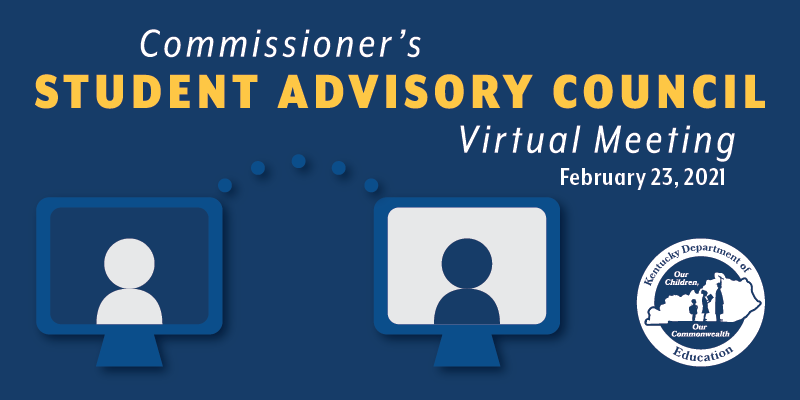 Members of the Kentucky Department of Education’s (KDE’s) Commissioner’s Student Advisory Council (SAC) agreed in a Feb. 23 virtual meeting that the effect of the pandemic will not easily be remedied by standard educational practices.
Members of the Kentucky Department of Education’s (KDE’s) Commissioner’s Student Advisory Council (SAC) agreed in a Feb. 23 virtual meeting that the effect of the pandemic will not easily be remedied by standard educational practices.
Commissioner of Education Jason E. Glass asked members for their input on teaching and learning in a post-pandemic world.
“There’s been a lot of conversation about learning loss,” said Glass.
Miles McGinnis, a senior at South Oldham High School (Oldham County), said one way to help make up for learning loss due to extended non-traditional instruction could be promoting outside learning through field trips and other activities, when possible.
Rohin Dutt, a junior at duPont Manual High School (Jefferson County), suggested that when it comes to virtual learning, it may be better for teachers to engage with smaller groups of students in conversation instead of lectures.
When the possibility of summer programs was mentioned to help students catch up on learning before the next school year, Logan Justice, a junior at Paul Laurence Dunbar High School (Fayette County), said students may view mandatory summer programs as a negative if they are lecture-based.
Anastasia Panaretos, a sophomore at South Oldham High School (Oldham County), agreed that a more interactive summer learning program might be more beneficial.
“One of the biggest issues I see among my peers is apathy,” said Drake Calhoun, a sophomore at Calloway County High School. “So, when creating a summer program, it will be important to reinstate enthusiasm.”
Glass also provided an update on 2021 state assessment and accountability after the U.S. Department of Education’s (USED’s) decision to continue to require state testing amid the pandemic. Instead of canceling testing, USED advised states to pursue other assessment flexibilities, including administering a shortened version of the statewide assessment, which the Kentucky Department of Education (KDE) prepared for in anticipation of the USED decision.
“Certainly, we need to understand the impact of the COVID-19 pandemic on basic academic skills, but there are much better ways to go about it than subjecting millions of students to yet another disruption to learning,” Glass said. “Especially when we know the results from these assessments are going to be questionable at best.”
Anna Williams, a senior at Anderson County High School, said she “doesn’t see the value” in continuing with testing because students and teachers already are struggling. “It’s not the right timing and it’s a lot of extra pressure and stress for the educational community,” she said.
Trevin Bevins, a junior at Shelby Valley High School (Pike County), said the time spent testing could be used to catch students up on learning they have lost.
Laila Hayes, a senior at duPont Manual High School (Jefferson County) countered that continuing with testing could have a positive effect because of the data gathered, but wondered whether it was feasible to alter the tests in order to get the results back sooner. Associate Commissioner Rhonda Sims of KDE’s Office of Assessment and Accountability, said during the meeting that tests have been shortened to provide more flexibility for testing.
The department’s spring 2021 testing plan currently includes flexible test windows, a reduction in the time for assessment administration, where possible, and an option to bring in small groups of full-time virtual students for an in-person assessment.
All in-person test administrators should follow the “Guidance on Safety Expectations and Best Practices for Kentucky Schools (K-12)” and the recommendation of local health departments.
Equity Project
SAC member Panaretos and KDE Deputy Commissioner and Chief Equity Officer Thomas Woods-Tucker presented their new project, called the Equity Project. The goal is to create free resources KDE can distribute to Kentucky schools that will help them create an environment where students, no matter their race, gender, ethnicity or ability, can receive the same education and respect as the majority of the student population.
A few examples of these resources Panaretos provided include podcasts, newspaper articles and brief videos that share Kentuckians’ stories of how they dealt with inequality.
“I am very much in support of this project,” said Wallace Caleb Bates, a senior at Breathitt County High School. “I believe that storytelling is one of the most powerful methods.”
Woods-Tucker said the project is focused on many different aspects of diversity, including gender, ethnicity, gender identification and sexuality.
“We want to be inclusive about this as we look at this umbrella of diversity,” he said.
Commissioner’s Virtual Listening Tour
Council members were encouraged to sign up to help facilitate the commissioner’s upcoming virtual listening tour.
Members of the public who wish to attend the listening tour may pre-register for a date that will work best for their schedule. If unsure at this time about which date will work, all possible dates may be selected.
Dates and times:
- April 6, 6-7:30 p.m. ET: Greater Louisville Educational Cooperative (Louisville)
- April 8, 6-7:30 p.m. CT: West Kentucky Educational Cooperative (Murray)
- April 15, 6-7:30 p.m. CT: Green River Regional Educational Cooperative (Bowling Green)
- April 20, 6-7:30 p.m. ET: Southeast/South-Central Educational Cooperative (Richmond)
- April 22, 6-7:30 p.m. ET: Central Kentucky Educational Cooperative (Lexington)
- April 27, 6-7:30 p.m. ET: Northern Kentucky Cooperative for Education Services (Cold Springs)
- April 29, 6-7:30 p.m. ET: Ohio Valley Educational Cooperative (Shelbyville)
- May 4, 6-7:30 p.m. ET: Kentucky Valley Educational Cooperative (Hazard)
- May 6, 6-7:30 p.m. ET: Kentucky Educational Development Cooperative (Ashland)



Leave A Comment